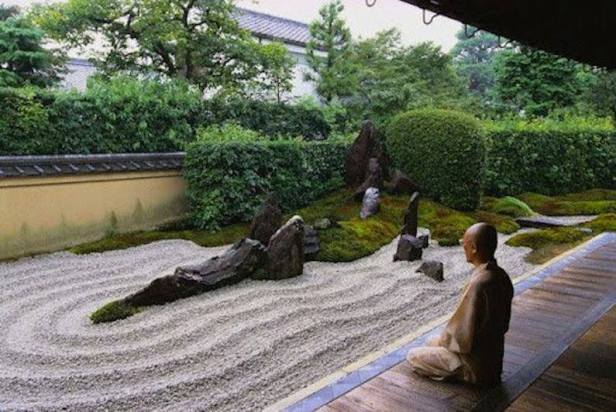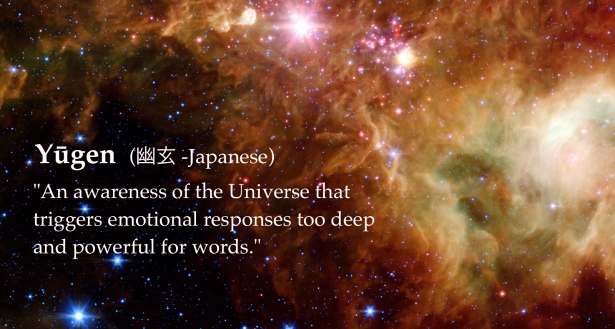“Yūgen is an important concept in traditional Japanese aesthetics. The exact translation of the word depends on the context. Yūgen is not an allusion to another world. It is about this world, this experience…
“To watch the sun sink behind a flower clad hill. To wander on in a huge forest without thought of return. To stand upon the shore and gaze after a boat that disappears behind distant islands. To contemplate the flight of wild geese seen and lost among the clouds…” ~Zeami Motokiyo
Japanese aesthetic ideals are most heavily influenced by Japanese Buddhism. In the Buddhist tradition, all things are considered as either evolving from or dissolving into nothingness. This “nothingness” is not empty space. It is rather a space of potentiality.
If the seas represent potential then each thing is like a wave arising from it and returning to it. There are no permanent waves. There are no perfect waves. At no point is a wave complete, even at its peak. Nature is seen as a dynamic whole that is to be admired and appreciated.
This appreciation of nature has been fundamental to many Japanese aesthetic ideals, “arts,” and other cultural elements. In this respect, the notion of “art” (or its conceptual equivalent) is also quite different from Western traditions..
Japanese aesthetics is a set of ancient ideals that include “wabi” (transient and stark beauty), “sabi” (the beauty of natural aging), and “yūgen.” These ideals, and others, underpin much of Japanese cultural and aesthetic norms.. Thus, while seen as a philosophy in Western societies, the concept of aesthetics in Japan is seen as an integral part of daily life.

Wabi and sabi refers to a mindful approach to everyday life. Over time their meanings overlapped and converged until they are unified into wabi-sabi (侘寂), the aesthetic defined as the beauty of things “imperfect, impermanent, and incomplete.”
Things in bud, or things in decay, as it were, are more evocative of wabi-sabi than things in full bloom because they suggest the transience of things. As things come and go, they show signs of their coming or going and these signs are considered to be beautiful.
In this, beauty is an altered state of consciousness and can be seen in the mundane and simple. The signatures of nature can be so subtle that it takes a quiet mind and a cultivated eye to discern them. In Zen philosophy there are seven aesthetic principles for achieving wabi-sabi.
Fukinsei (不均整): asymmetry, irregularity; Kanso (簡素): simplicity; Koko: basic, weathered; Shizen (自然): without pretense, natural; Yugen (幽玄): subtly profound grace, not obvious; Datsuzoku (脱俗): unbounded by convention, free; Seijaku (静寂): tranquility, stillness.
Each of these things are found in nature but can suggest virtues of human character and appropriateness of behaviour. This, in turn suggests that virtue can be instilled through an appreciation of, and practice in, the arts. Hence, aesthetic ideals have an ethical connotation and pervade much of the Japanese culture.”
Principle text source: Wikipedia – Japanese Aesthetics
See also: 7 Japanese Aesthetic Principles to Change your Thinking * Moving in Synch with the Universe * The Way of Zen – Wisdom, Compassion & Mindfulness *


Very inspiring aesthetic, Thanks Chris!
Blessings!
Reblogged this on Advayavada Buddhism.
Reblogged this on Find Your Middle Ground and commented:
This is such an interesting perspective, and an insightful article on the Japanese Buddhist tradition. May we find new appreciation through these words.
listen to alan watts talks (if you have not allready) he explains all this so clearly….
Thank you for this, Val! Wishing you a most peace-filled Sunday. 🙂
I apologize, Chris, I meant to thank both you and Val for this your wonderful article. (Val had re-blogged and I mixed up my response!) 🙂
Wishing you peace and light,
Allison
Love this:
If the seas represent potential then each thing is like a wave arising from it and returning to it. There are no permanent waves. There are no perfect waves. At no point is a wave complete, even at its peak. Nature is seen as a dynamic whole that is to be admired and appreciated.
Pingback: “Dismiss Whatever Insults Your Own Soul” – Walt Whitman | Creative by Nature
Pingback: Albert Einstein – God’s Gift to the Creationists? | Creative by Nature
Pingback: Yugen | Dreams of Earth
Pingback: Glimpses of a Creative Living Universe | Creative by Nature
beautiful little article
Pingback: How Life Self-Organizes, by Joanna Macy | Creative by Nature
Pingback: Deep Awareness of the Universe
Thank you!! Though most of the words are from Wikipedia, please make sure you include that link. ~Christopher
Pingback: The Rise of the Cultural Creatives | Creative by Nature
Pingback: Yūgen (幽玄) – Deep Awareness of the Universe | guyhillis
Pingback: Zen & the Art of Living Deeply | Creative by Nature
Pingback: Zen and the Art of Living Deeply | Zen Flash
Pingback: Zen and the Art of Living Deeply
Pingback: Zen and the Art of Living Deeply | panindiahindu
Pingback: The Journal Zen si Arta de a Trai Profund - The Journal
Pingback: The Journal Yugen - Constientizarea Profunda a Universului - The Journal
Pingback: Zen – umjetnost istinskog življenja – Alternativa Informacije
Pingback: Yūgen (幽玄) – Deep Awareness of the Universe | arthur~battram…
Pingback: Now that’s deep | leapyearphotochallenge
Pingback: Yūgen (幽玄) – Deep Awa...
Pingback: The Final Piece: What’s my Eureka moment with respect to constructive emotional theory? – Climbing Higher
Pingback: Healing Spread: Question 1 – Seraphin Perihelion
Pingback: Happiness Cannot Be Pursued | Creative by Nature
OMG! I always feel that when running outdoors and stop for a while to watch my beautiful sunsets.
Pingback: Solar Eclipse 2017 | BEING BOISE
Pingback: Reading List – Third Quarter 2017 – A Life Less Busy
Pingback: I Like it Because | roboto13731
Pingback: Japanese Aesthetics and Yūgen (幽玄) | roboto13731
Pingback: Getting To Noh The Present Moment with Noh Theatre at Yamamoto Nohgakudo | Sydney In Osaka
Pingback: Zen and the Art of Living Deeply | Zen Flash
Pingback: Wordless – Annettes Garten / Annette's Garden